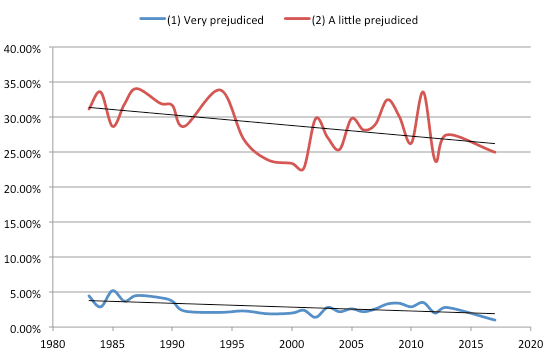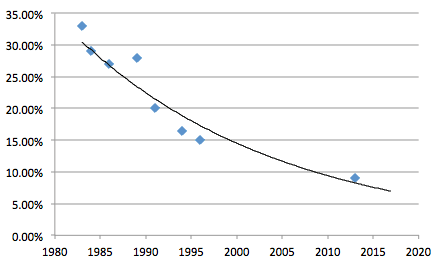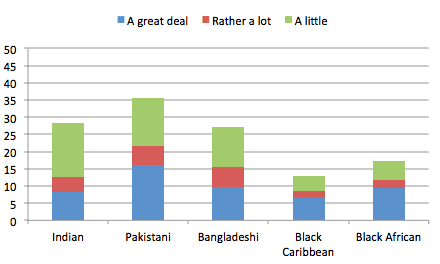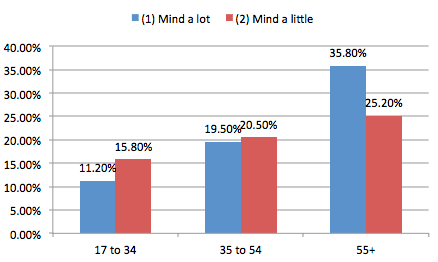Policy Exchange - Accentuating the negative on race
3 Oct 2017 09:55 AM
There has been a sharp decline in hard racist attitudes in Britain in the past few years with only one per cent of the population, and those mainly over 50, admitting to being “very prejudiced”.
And there has been a continuing steady decline in the number of white people objecting to a close relative marrying a black or Asian person, though the percentage of Asians objecting to a relative marrying a white person (and even more so a black person) is significantly higher.
These were the headlines and keypoints that you did NOT read from the NatCen/Runnymede Trust report published at the end of last week, though most of that data could be found in the report (the data about Asian marriage objections is from the 2010 Ethnic Minority British Election Study or EMBES)[1].
Instead you would have read about “not-so-liberal Britain: one in four admits race prejudice” and similar pessimistic headlines. This is because the report largely ignored the gradations in levels of prejudice found in its own data and chose to place the most negative slant on its findings.
It is true that one in four people (26 per cent) admit to being prejudiced—slightly fewer than when the question was asked in 2013 at 30.3 per cent—but just one per cent self-define as very prejudiced, with 25 per cent being just a little prejudiced.
There is no widely agreed definition of racism but it is clearly a complex phenomenon that operates on a wide spectrum and manifests itself in many different ways. Although most people agree that it has been in decline in recent decades many people on the anti-racist left maintain that it has merely become less visible, a view with a surprising amount of support in government and Whitehall.
It is indeed possible, as the report reasonably points out, that the prejudice figures quoted above under-estimate peoples’ true feelings as there is a strong social taboo against racial prejudice. But it is also possible that at least some people are admitting to prejudice because of the greater self-awareness about the biases and stereotypes most of us walk around with. They may, in other words, be expressing the sentiment made famous in the Avenue Q song Everyone’s a Little Bit Racist which includes the lyrics:
- “Everyone’s a little bit
- Racist, sometimes.
- Doesn’t mean we go around committing
- Hate crimes.
- Look around and
- You will find,
- No one’s really
- Colour-blind.
- Maybe it’s a fact
- We all should face.
- Everyone makes
- Judgments…
- Based on race.”
What if the 25 per cent were just speaking honestly, like in Avenue Q, about the fact that they operate with stereotypes and so sometimes misjudge people? In any case, as seen in the graph below, the most prejudiced are in a very small minority while both the very and a little bit prejudiced are on long-term declining trajectories.
Figure 1. How would you describe yourself… prejudiced against people of other races?

Marriage attitudes
When the NatCen/Runnymede report looks back at the 2013 British Social Attitudes data on marrying across ethnic lines it also collapses the different shades of prejudice and simply states that 22 per cent of respondents said they would mind if a close family member married a black/West Indian person (21 per cent for an Asian person). But only 9.1 per cent objected a lot, while 13 per cent minded a little. (And all of these numbers are lower for younger cohorts.)
If we extrapolate from the long-term general trend then we can project that those who objected a lot would have fallen to 7 per cent in 2017, as seen in the graph below.
Figure 2. Would you mind a lot if a close relative were to marry a person of black or West Indian origin?

European context
The other striking finding in the report was from the European Social Survey 2014 (ESS). Almost 18 per cent of British adults admitted they thought some races or ethnic groups were born less intelligent.
Across all countries taking part in the ESS, the share agreeing that some races or ethnic groups are born less intelligent, the average was 14.1 per cent. The United Kingdom with a score of 17.6 per cent is thus roughly middle of the table on this measure. The country with the highest share was the Czech Republic – 40.8 per cent.
| Some races or ethnic groups: born less intelligent |
Yes |
No |
| Country |
|
|
| Czech Republic |
40.8 |
59.2 |
| Portugal |
37.6 |
62.4 |
| Hungary |
33.8 |
66.2 |
| Estonia |
33.5 |
66.5 |
| Israel |
26.9 |
73.1 |
| Slovenia |
23.2 |
76.8 |
| Lithuania |
23.1 |
76.9 |
| Belgium |
18 |
82 |
| United Kingdom |
17.6 |
82.4 |
| Ireland |
15.7 |
84.3 |
| Switzerland |
14.7 |
85.3 |
| Finland |
12.7 |
87.3 |
| France |
11.8 |
88.2 |
| Austria |
11.7 |
88.3 |
| Denmark |
11.6 |
88.4 |
| Spain |
11.5 |
88.5 |
| Poland |
11.5 |
88.5 |
| Germany |
9.8 |
90.2 |
| Netherlands |
6.3 |
93.7 |
| Norway |
3 |
97 |
| Sweden |
2.4 |
97.6 |
| Total |
14.1 |
85.9 |
|
|
|
Prejudice is not just for white people
An interesting sub-theme, not mentioned in the NatCen/Runnymede report, is the extent to which ethnic minority people themselves admit to prejudiced views in the ESS survey. Of those UK respondents identifying as belonging to an ethnic minority, 15.5 per cent said they believed some races or ethnic groups were born less intelligent compared to 17.8 per cent of the self-identified ethnic majority.
And as mentioned in the first paragraph there are possibly greater reservations about partnering “out” among most British minority groups than among the white British. EMBES shows that 28.4 per cent of Indians would object to a close relative marrying a white person, as would 35.5 per cent of Pakistanis, and 27.1 per cent of Bangladeshis (Those saying it would bother them a great deal stood at 8.2 per cent, 16.3 per cent and 9.7 per cent respectively). For both black Caribbeans and black Africans, the figures are lower at 12.9 and 17.1 per cent respectively (6.6 per cent and 9.4 per cent said it would be a great deal respectively).
Figure 3. Would it bother you if one of your close relatives were to marry a white person? (EMBES 2010)

When asking South Asians about their willingness to see a family member marry a black person, the shares become more pronounced and this is most true of Indians, for whom 38.9 per cent said they would be bothered (14.5 per cent a great deal).
This is a complex issue. Resistance to marrying out can, of course, be an expression of ethnic solidarity for minorities, or what Trevor Phillips has called “cultural protection”. Preference for people like oneself does not necessarily mean hostility to people not like oneself. And the marriage issue is generally acknowledged to be a poor proxy for racial attitudes in general.
Nevertheless, the underlying assumption of the NatCen/Runnymede report is that prejudice is something whites people feel towards ethnic minorities. Is it not time we moved on from this and acknowledged the human fallibilities of all people? It may be the case that the prejudices of the majority are more impactful than those of minorities but as the minority population grows rapidly—and as minorities are more likely to live together in the same neighbourhoods—it is perhaps time that NatCen began to subdivide the opinion data on race prejudice by ethnicity (at least by majority and minority).
Underplaying the positives
The report points to the new negative finding on marriage attitudes from 2013 of 44 per cent white British people objecting to a close relative marrying a Muslim.
Again, note how the statistics roll together all levels of objection—in fact 23.4 per cent objected a lot to a close relative marrying a Muslim while 21 per cent objected a little.
And it was again overlooked that younger age cohorts tend to be much more liberal on such measures. While 35.8 per cent of those aged 55 or more objected a lot, this was as low as 11.2 per cent amongst the young (17-34 year-olds). (See graph below)
Given that illiberal and racist attitudes (at least self-reported) do seem to have declined over time, it is reasonable to assume that these youngsters will carry such attitudes with them into later life. This is a point not made by the report’s authors.
Figure 4. Would you mind if a close relative were to marry a person who is Muslim?

The authors
Who are the authors? The Runnymede Trust is an anti-racism lobby group that campaigns on issues of race and racism but does not pretend to be a neutral authority. NatCen on the other hand is a major independent research institute that does claim to be a neutral authority. It produces the invaluable annual British Social Attitudes survey and many, if not most, of its contracts come from the public sector. It states on its website that “as a non-profit organisation we are never compromised by commercial or political agendas.” In which case why is it working with an organisation with a very explicit political agenda?
The real reason we should be concerned with prejudice is whether it sustains unjustified racial disadvantage. The tendentious comments at the end of the report about the connection between prejudice and inequality provide very thin evidence for this. They are exactly what one would expect from a campaigning organisation like Runnymede but not from a quasi-official body like NatCen. We hope that the government’s race disparity unit, due to report later this month, does not follow this Runnymede narrative.
A self-fulfilling prophecy
There is a danger in producing overly alarming and pessimistic reports such as these. The discussion of the report on BBC2’s The Daily Politics last Friday leapt straight in with discussion of the 26 per cent figure without revealing that just 1 per cent had admitted to being very prejudiced. Many impressionable young people from a minority background watching might conclude that the levels of wariness and prejudice against them are greater than they actually are. The risk in this is that they then expect discrimination around every corner, lower their aspirations, and do not apply for that job or go for that university course. This relentless pessimism about race rather than liberating society from the shadow of racism can end up reinforcing racial division.
[1] EMBES and BSA phrase the same question slightly differently. EMBES asks “For each of the following statements please indicate how much it would bother you if (a) one of your close relatives were to marry a white person”. The question in BSA is “Would you mind if one of your close relatives were to marry a person of black or West Indian heritage?”
Possible responses to EMBES were (1) a great deal, (2) rather a lot, (3) a little (4) not very much and (5) not at all. In order to make as close as comparison as possible with the BSA, we have restricted our measure of prejudice to the first three alone.